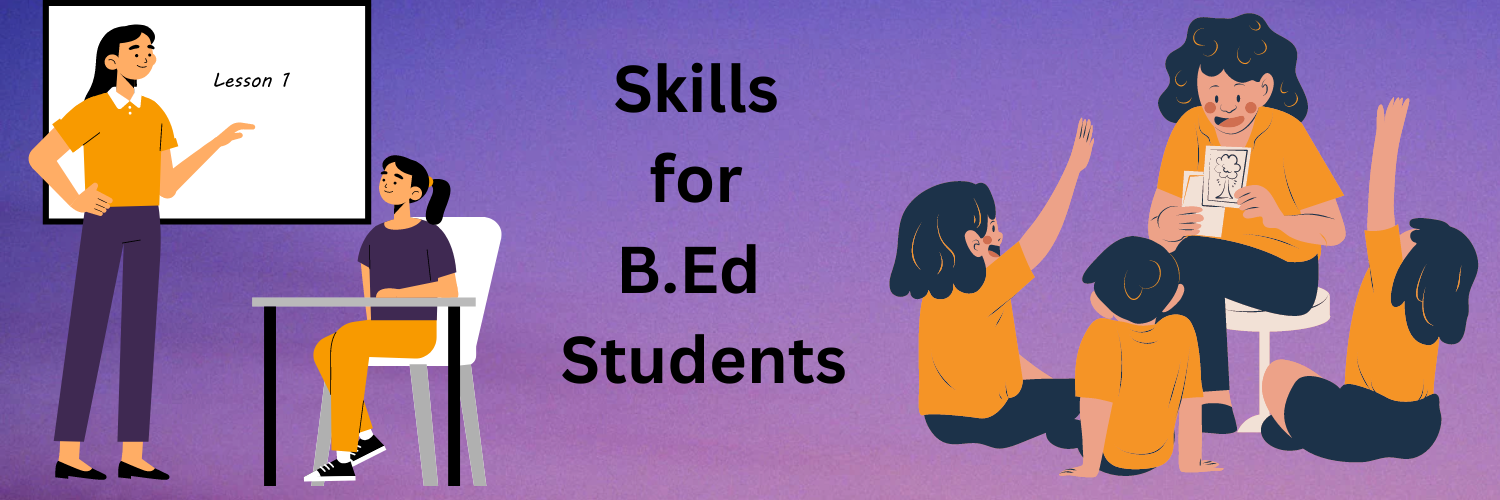Landing a job as a teacher is exciting, but it also comes with a big responsibility – shaping young minds. If you’re a B.Ed student aiming to excel in your teaching career, equipping yourself with the right skills is essential.
As you progress through your B.Ed. program, you’ll gain a strong foundation in subject matter knowledge and teaching pedagogy. But remember, teaching is more than just presenting information. It’s about creating a dynamic learning environment, fostering meaningful connections with students, and nurturing their potential. The skills explored here will empower you to do just that and make a lasting difference in the lives of your students.
This blog will be a valuable resource for B.Ed students who want to ensure they have the skills they need to succeed in the classroom.
Pedagogical Knowledge
- Familiarize yourself with various teaching approaches such as lecture-based learning for direct instruction, inquiry-based learning that encourages students to ask questions and explore, and collaborative learning that involves group work and peer interaction.
- Know when and how to use each method effectively to cater to different learning styles and classroom dynamics.
- Explore behaviorism, which focuses on observable behaviors and their responses to stimuli, applying reinforcement and punishment to shape behavior.
- Study constructivism, where learners actively construct their own understanding and knowledge through experiences, encouraging hands-on activities and problem-solving.
- Understand socio-cultural learning, which emphasizes the impact of social interactions and cultural context on learning, incorporating collaborative activities and discussions.
- Learn how to create engaging and structured lesson plans that align with educational standards and objectives.
- Incorporate differentiation strategies to meet the diverse needs of students by providing various ways to access content, engage in learning activities, and demonstrate understanding.
Subject Expertise
- Deepen your knowledge in the subjects you will teach by thoroughly understanding the core concepts, theories, and latest developments.
- Regularly update your knowledge by reading textbooks, research articles, and academic journals to ensure you are teaching the most current information.
- Attend workshops, webinars, and conferences related to your subject area to stay informed about new teaching methods, technologies, and research.
- Engage with subject-specific communities, such as professional organizations and online forums, to exchange ideas, resources, and best practices.
Classroom Management
- Establish clear, consistent classroom rules and consequences that students understand and agree to follow.
- Implement positive reinforcement techniques, such as praise, rewards, and incentives, to encourage and acknowledge positive behavior.
- Foster a safe and respectful classroom atmosphere where students feel valued and comfortable expressing themselves.
- Address any form of bullying or discrimination promptly and create an inclusive environment that respects diversity.
- Plan lessons efficiently to make the most of instructional time, balancing different types of activities to maintain student engagement.
- Manage transitions smoothly between activities to minimize downtime and keep students focused.
Communication Skills
- Use appropriate language for different age groups, ensuring that instructions and explanations are clear and easy to understand.
- Break down complex information into manageable parts to aid student comprehension.
- Show genuine interest in students’ questions, concerns, and feedback, demonstrating that you value their input.
- Use eye contact, nodding, and verbal affirmations to show you are actively listening and engaged in the conversation.
- Be aware of your body language, ensuring it is positive and open to create a welcoming environment.
- Use gestures and maintain eye contact to emphasize points and engage students.
Technology Integration
- Familiarize yourself with various educational software and tools that can enhance learning and teaching.
- Utilize online resources, digital libraries, and interactive platforms to access and share educational materials.
- Incorporate multimedia presentations, such as videos, animations, and interactive elements, to make lessons more engaging.
- Use virtual labs for science subjects and online quizzes for formative assessments to provide interactive and immediate feedback.
Assessment and Evaluation
- Use formative assessments, such as quizzes, classroom discussions, and observations, to monitor student progress and inform instruction.
- Administer summative assessments, including end-of-term tests, projects, and exams, to evaluate overall learning and achievement.
- Create varied assessment methods, such as multiple-choice questions, short-answer tests, and project-based assessments, to cater to diverse learning styles.
- Ensure that assessments align with learning objectives and standards, providing a fair evaluation of student understanding.
- Offer specific, actionable feedback that helps students understand their strengths and areas for improvement.
- Provide feedback promptly to reinforce learning and allow students to make immediate improvements.
Inclusive Education
- Learn about special education and the needs of students with disabilities, adapting instruction to provide appropriate support.
- Use strategies like visual aids, simplified language, and peer support to help English language learners (ELL) succeed.
- Adapt your teaching methods to accommodate different learning styles and abilities, ensuring that all students can access the curriculum.
- Use flexible grouping strategies to provide targeted instruction based on students’ needs and abilities.
- Implement UDL principles by presenting information in multiple ways to address different learning preferences.
- Use diverse activities and materials to engage all students, ensuring that the content is accessible to everyone.
Research Skills
- Stay informed about educational trends, best practices, and evidence-based strategies by regularly reading educational research.
- Critically evaluate research findings and consider how they can be applied to improve your teaching practices.
- Perform small-scale research projects within your classroom to identify areas for improvement and test new teaching methods.
- Analyze data from your research to make informed decisions and continuously improve your teaching practices.
Professional Ethics
- Adhere to the ethical standards set by educational institutions and professional organizations, maintaining integrity and professionalism in all interactions.
- Demonstrate honesty and integrity in your dealings with students, colleagues, and parents.
- Respect student privacy by keeping personal information confidential and only sharing it when necessary and appropriate.
- Maintain professional boundaries with students to avoid any behavior that could be misinterpreted.
- Collaborate with colleagues to share resources, support each other, and contribute to a positive working environment.
- Engage in continuous professional development to improve your teaching skills and stay updated with educational advancements.
- Participate in professional organizations, attend conferences, and contribute to educational discussions to enhance your professional growth.
Conclusion
The path to becoming a successful teacher is paved with dedication and the right skillset. By honing these essential skills throughout your B.Ed. program, especially if you are attending the best B.Ed. college, you will be well-prepared to inspire and empower your students on their educational journeys. Remember, teaching is a lifelong learning profession, so embrace every opportunity to grow and develop as an educator.






